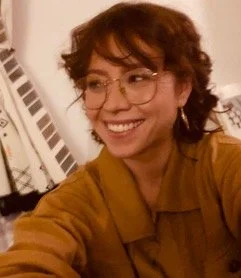Ashley Howell Bunn Talks Life, Death, and Poetry
Interview by Gabriela V. Everett & Katie Lynn Johnston
Today, our editors chatted with Ashley Howell Bunn about their experiences with writing and physical movement, their poems “Ember” and “vision,” and what comes next.
Why do you think you are a writer? Were you always drawn to writing and other creative endeavors?
I think writing is something that moves through all people, but some people notice it more openly or choose to express their human experience through words. I have always expressed my experience this way. When I was seven, I remember writing a poem about the 24 hours of a day. I found it baffling that each day has the same amount of time, but could be felt so differently (I still find that baffling). As I wrote the words down, that feeling of relief came to find a way to express the abstract nature of time. I felt still for a moment, and I think that’s when I knew I would also use writing as a tool for my processing and connection.
As someone who practices and guides yoga, do you find yoga and poetry intersect? Does inspiration ever strike while you are teaching or practicing?
I love this question, and I think it is an important one. We so often disconnect our intellectual or emotional experience with our physical one, even though they are inextricably linked. We hold our experiences in our physical and subtle bodies, and writing is a way to tap into these experiences. In a way, writing is a physical act. However, if we don’t allow ourselves to acknowledge the physical aspect of memory, experience, and emotion, we can find ourselves blocked and energetically stuck. I love somatic writing because it encourages movement, breath, and sound as a way to connect our physical experience with our creative and emotional experience.
Your use of sound and rhythm in your poetry feels primal—like someone's first words. The fast inversions create a beautiful link that draws readers into each new stanza; what made you want to write something that plays with remixing and transforming words?
Poetry started as song, and I believe that sound—that primal sound, like the ones we first speak—are so powerful. In Sanskrit, sounds have energetic vibrations and carry great importance. I wanted to pull this aspect into my poetry. In the poem “vision” I was actually reflecting on my father’s words after his stroke. He was a very intelligent and well-spoken man, but after his stroke he couldn’t speak. He still communicated through small sounds and words he could remember. I found this to be a breathtaking and profound experience, watching the process of losing language only to gain a more universal way of communication. He passed away shortly after I wrote that poem; however, I feel that we communicated more in those last weeks of his life than we did in all his years previously. When vocabulary is gone, emotion, love, and true connection are what we have to depend on.
In “Ember,” we are greeted with what feels like a grounding narrative for "Vision." Both carry a sense of being close to a new life in my eyes. As the narrative of childbirth is clear in "Ember" and feels implied in "v
ision," what about the experience of creating a new life inspired your poems? What did you glean from it as a creative writer?
I love that “vision” can be interpreted as a poem about new life, as I wrote it about dying. Giving birth to my son and supporting my father as he passed had so many parallels. There is a letting go that has to happen in the process, a giving up. The contractions that lead to the first breath are so similar to the last breath. Both seemed to come in waves which one has to ride. If you fight the waves you only find struggle. Once you let go you are able to float, to surrender. There is violence and beauty in both birth and death, and the cycle itself contains both.
What are you working on now? Do you have any exciting projects you would like to talk about?
My first chapbook, in coming light, just came out through Middle Creek Publishing. The poem, “vision,” begins this collection, and it deals with grief and life, struggle and healing, and energetic and physical bodies. I am very excited to share this book with the world, and I am very grateful to Mulberry Literary for publishing “vision” first. I want to continue working with somatic poetry, and I am attending a residency this summer to work on an essay and poetry collection centering around recovery from addiction. This is a very personal subject, but one I am very passionate about sharing. My father died of addiction, and I am currently in recovery. I want to share how physical and energetic work have supported me, and begin to trace this cycle through generational and societal lines.
Ashley Howell Bunn completed her MFA in poetry through Regis University and holds a MA in Literature from Northwestern University. She is on the editorial staff for the literary journal, Inverted Syntax. Her work has previously appeared in The Colorado Sun, South Broadway Ghost Society, Global Poemic, Twenty Bellows, patchwork litmag, Mulberry Literary, and others. Her first chapbook, in coming light, is available through Middle Creek Publishing. She lives in Denver, CO with her child where she guides and practices yoga and runs in the sunshine.
